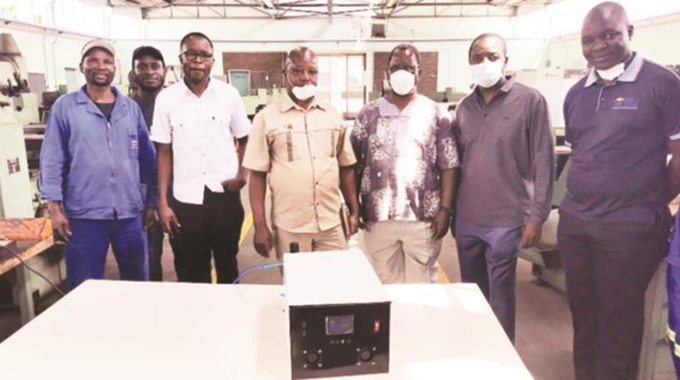HIT develops ventilator

Herald Reporters
The Harare Institute of Technology (HIT) has developed a ventilator which it is testing before trials begin, with the potential of making 40 such gadgets per day, while other tertiary institutions are already producing sanitisers and masks, as they join the fight against Covid-19.
HIT Vice Chancellor Engineer Quinton Kanhukamwe said yesterday that a team of engineers at his institution were working on a ventilator, which they were now improving.
“It’s true that our university has developed a ventilator,” he said.
“Our team is moving at speed to do trials. Be rest assured, we have this innovation and just recently Prof Fanuel Tagwira, Permanent Secretary for the Ministry of Higher and Tertiary Education, Science, Innovation and Technology Development and Mr Nick Mangwana, Permanent Secretary in the Ministry of Information, Publicity and Broadcasting Services visited us to see the work we are doing.”
Zimbabwe urgently needs a large number of ventilators and Personal Protective Equipment (PPEs) to help the country fight the COVID-19 Pandemic.
Researchers at HIT and a number of universities in the country are reported to be working on urgent and diverse projects in response to the Covid-19.
All this is expected to help support the country’s healthcare delivery system in the wake of the escalating Covid-19.
Ventilators are crucial to fighting the worst symptoms of Covid-19, the disease caused by the novel coronavirus.
They are used to deliver room air or oxygen – enriched gas into the breathing circuit to treat patients with conditions like pneumonia or during mass casualty events.
Globally, there is a massive shortage of ventilators and surgical masks due to the crippling impact of the Covid-19.
The National University of Science and Technology (NUST) in Bulawayo has also been roped in by the Government to do laboratory testing for coronavirus specimens.
NUST will help the National Reference Laboratory in Harare to confirm tests.
Great Zimbabwe University (GZU) has launched a sanitiser production project that will supply the entire Masvingo province.
Production of the sanitisers by GZU’s School of Natural Sciences started yesterday after the institution responded to President Mnangagwa’s call for local institutions of higher learning to be hotspots for solutions to the country’s nagging challenges such as the Covid-19 pandemic.
The university joined the anti-Covid-19 fray after sourcing a donation of 600 litres of ethanol from Lowveld sugar producer Tongaat Hulett Zimbabwe.
This development gave fresh impetus to the fight against Covid-19 here after the Masvingo Minister of State for Provincial Affairs Ezra Chadzamira announced the donation of 160 knap-sacks for spraying public places across the province.
Speaking during the handover of sanitizers manufactured by his institution at GZU’s main campus yesterday, Vice Chancellor Professor Rungano Zvobgo appealed for more donations of raw materials for production of more sanitisers to fight Covid-19.
“We are in a state of war, which must be fought in all fronts,” he said. “The manufacturing of sanitisers by our School of Natural Sciences is GZU’s attempt to deal with the Covid-19 virus.”
At Chinhoyi University of Technology (CUT), shortage of labour has affected production of face masks at its production unit.
Speaking to The Herald yesterday, the university’s spokesperson, Dr Musekiwa Tapera said the university, which has the capacity of producing more than 12 000 face masks a week, is producing at least 3 000 marks per day shift with shortage of manpower affecting the production.
Dr Tapera said as of mid-day yesterday, 2 000 masks had been supplied to two clients.
Although the university could not readily provide the manufacturing and retail costs, Dr Tapera said the retail price was cheaper and affordable, as a measure to provide the nation with enough masks to protect against the virus.
The project, which has been established at the university’s Department of Clothing and Textiles, is the institution’s complementary role to the Government as it helps to curtail the deadly Covid-19.
Zimbabwe has seven confirmed cases of Covid-19, one of which resulted in death.







Comments